The Rhetoric Level
School of Rhetoric
Success in Arma Dei Academy’s mission depends on the unique contribution that each stage of a classical Christian education makes to the formation of students. In the Grammar and Logic stages, students acquire information and the critical thinking skills necessary to discern genuine Truth, Goodness, and Beauty. In the Rhetoric stage, they acquire the skills necessary to persuasively promote Truth, Goodness, and Beauty, and so to serve others well and advance the Kingdom of God on earth.
Our Rhetoric program is premised on the conviction that objective Truth, Goodness, and Beauty exist in this world by design (and as a reflection) of the God who created humankind and all things. It is equally premised on the conviction that greater joy for creatures made in God’s image follows from a life of service to God and others than a life of service to one’s self. In an age where self-idolatry reigns, education as a whole naturally capitulates to concerns over what one can get rather than what one can give. Self-interest becomes the selling point of degree programs and curricular choices, and self-indulgence the trademark of the typical “high school experience.” By way of contrast, every aspect of Arma Dei’s Rhetoric program – from the curriculum to social events to spiritual retreats to international mission trips – is designed to orient students toward God and others rather than themselves, thereby orienting them toward true human flourishing and fulfillment.
Portrait of a Graduate

Arma Dei Academy’s mission is to glorify God by providing an excellent classical Christian education founded upon a biblical worldview which equips students to live purposefully and intelligently in service to God and others. Arma Dei Academy graduates are:
- Rooted in their identity as children of God on the basis of Christ’s work.
- Equipped to utilize the tools of learning for the rest of their lives.
- Able to discern and defend Truth, Goodness, and Beauty.
- Determined to serve God and others in order to advance the Kingdom of God.
- Yielded to the absolute authority of God’s Word in all things.
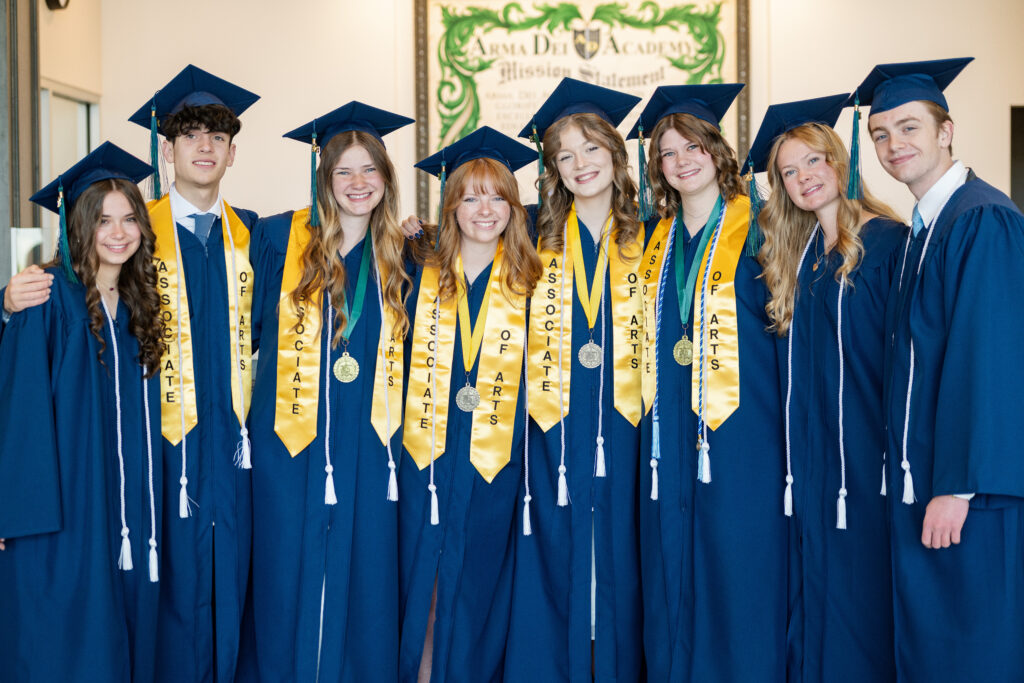
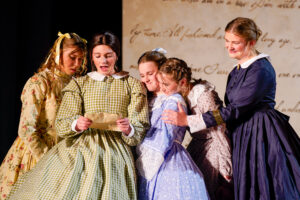 A Liberal Arts Curriculum
A Liberal Arts Curriculum
Against the modern educational trend to sacrifice core, traditional subjects in favor of more “practical,” skills-based courses or electives, the Rhetoric School delivers a time-tested, liberal arts curriculum to students. The “liberal arts” are those subjects that, according to traditional wisdom, free (“liberal” coming from the Latin work liberare, “to free”) student from his or her natural bondage to ignorance and instinct, and so permit that student to flourish both individually and socially. Arma Dei Rhetoric students receive a thorough grounding in the humanities (i.e., the history and literature of ancient, medieval, and modern periods), Christian theology and apologetics, mathematics, the sciences, formal rhetoric, and language (Latin, Greek, and Spanish). Required courses in music, art, and drama further refine their appreciation for beauty and their ability to express themselves powerfully, persuasively, and artfully. While the curriculum fully prepares students to flourish academically and professionally, it ultimately frees them to reflect the character of their Heavenly Father through lives of intentional, purposeful service to him and others.
The Great Conversation, Great Books, & Great Ideas
As Rhetoric students read the “great books” in their courses, they are simultaneously drawn into the “great conversation” with pivotal thinkers in the Western intellectual tradition and exposed to the “great ideas” (democracy, love, courage, progress, liberty, etc.) that have shaped Western civilization over the course of its history. Examples of works featured in the Rhetoric curriculum include Homer’s Iliad and Odyssey, Plato’s Republic, Augustine’s Confessions, Dante’s Divine Comedy, More’s Utopia, Machiavelli’s The Prince, Shakespeare’s Hamlet, Marx and Engel’s Communist Manifesto, and Dostoyevsky’s Crime and Punishment. Whether books are studied for the significance of their ideas or the depth of their insight into human nature and existence, they are critiqued through the lens of a biblical worldview and God’s ultimate vision for human flourishing.
Arma Dei Academy partners with Colorado Christian University to offer students dual credit (high school and college credit) for the majority of its core, liberal arts courses and select elective courses. Dual credit courses require an additional enrollment fee paid directly to CCU in addition to Arma Dei Academy’s tuition rates. Students may also pursue an Associate of Arts (AA) degree in Liberal Arts from CCU during their tenure in the Rhetoric School. All the degree requirements for the AA are met by Arma Dei Academy’s current course offerings.
Dual credit courses permit students progressing to university to:
- Complete their university education in a shorter time period or at a more relaxed pace.
- Double major in university by virtue of having satisfied their general education requirements and having more time in their schedule.
- Pursue courses related to their degree program and career ambitions earlier in their university careers.
- Save financially by omitting 1 to 2 years of university study at tuition rates between $40,000 to $100,000 per year.
The Rhetoric School offers an Associate of Arts (AA) Degree Track whereby students can earn an AA in Liberal Arts from Colorado Christian University entirely on the basis of Arma Dei’s current dual credit offerings. More than half of Arma Dei Academy’s graduates have earned the Associate of Arts degree concomitantly with their high school diplomas during their tenure at Arma Dei.
 Travel plays an important role in classical education. From the late 15th to early 20th centuries, on the culmination of their academic studies, students would embark on a “Grand Tour” of key cities in western history and culture. The Grand Tour was an essential part of a well-rounded education and the capstone of a true classical curriculum, intended to help the next generation of leaders broaden their horizons, test the practicality of their book learning, and deepen their social and academic awareness. In keeping with the spirit of the Grand Tour, Arma Dei has incorporated numerous trips that directly complement Rhetoric curriculum into its program of study.
Travel plays an important role in classical education. From the late 15th to early 20th centuries, on the culmination of their academic studies, students would embark on a “Grand Tour” of key cities in western history and culture. The Grand Tour was an essential part of a well-rounded education and the capstone of a true classical curriculum, intended to help the next generation of leaders broaden their horizons, test the practicality of their book learning, and deepen their social and academic awareness. In keeping with the spirit of the Grand Tour, Arma Dei has incorporated numerous trips that directly complement Rhetoric curriculum into its program of study.
As the capstone to their study of ancient history and literature, 9th-grade students visit London, England, where they observe ancient artifacts in the British Museum (e.g., the Cyril Cylinder, the Rosetta Stone, and the Parthenon Sculptures) and explore the remnants of amphitheaters, baths, tombstones, and temples from Roman England in central London and Bath. While in England they also visit sites of medieval and modern interest (The London Tower, Windsor Castle, Westminster Abbey, St. Paul’s Cathedral), walk in C.S. Lewis and J.R.R. Tolkien’s steps in Oxford, and enjoy some Fish & Chips along the River Thames.
10th-grade students launch their study of medieval history with a camping trip to Mesa Verde National Park, where they encounter the architecture (cliff dwellings), customs, and religion of 12th-century Puebloan Indians. Their observations of Puebloan civilization inform subsequent reflection in the classroom upon the comparative complexity of technology and thought discovered in medieval Europe, and the role that both Christianity and the inheritance of antiquity played in that complexity. As they proceed in their study of history to the age of exploration and colonization, 10th-grade students travel to Florida to visit St. Augustine, the oldest continually inhabited town in America and center of numerous museums dedicated to colonial American life. The Florida trip equally anticipates students’ 11th and 12th-grade studies in modern American history, with trips to Kennedy Space Center and sites of significance to the American civil rights movement.
11th-grade students participate in a mission trip to Guatemala, where they partner with One Way Community to serve impoverished communities in the outskirts of Antigua and rural mountainous villages. Students run after-school programs for youth and visit indigenous and Spanish-speaking families to deliver groceries, build beds, install stoves and water filters, and trade stories. The Guatemala mission trip complements 11th-grade students’ study of Spanish. More significantly, it reinforces Arma Dei’s mission to equip students for intentional, purposeful lives of service by exposing them to the depth of human needs in this world and giving them opportunity to address those needs with the hope of the Christian gospel and concrete measures that improve the standard of living for Guatemalan families.
Students visit Italy and France on their Senior Academic Capstone Trip. Their itinerary includes Rome, Pompeii, Florence, Pisa, and Paris, and comprises significant historical sites (St. Peter’s Basilica, the Colosseum, the Catacombs, the Palace of Versailles, etc.) and significant works of art (the Sistine Chapel, David, the Mona Lisa, etc.) in the history of Western civilization. Of course, gelatos and espressos on the Cinque Terre coastline also constitute an important part of the Senior Trip experience. The Senior trip is intentionally designed as the ultimate capstone to students’ participation in the “great conversation” during their course of study at Arma Dei Academy.
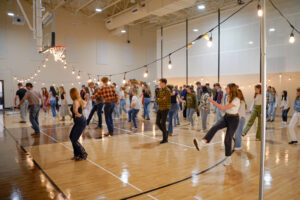 Spiritual Growth
Spiritual Growth
The Rhetoric School provides intentional space for spiritual growth through annual retreats, weekly participation in Chapel, student-led morning assemblies that include worship and reflection upon Scripture, and extracurricular Bible studies led by mature Christian adults in the Arma Dei community. Spiritual growth is also fostered by Rhetoric teachers with strong Christian faith and character who intentionally encourage and mentor students both formally (through classroom teaching and discussion) and informally (through conversations in the hallway, over lunch, or in the coffee shop).
Retreats
Annual retreats provide space for students to deepen relationships with their peers, teachers, and God as they study Scripture, experience the beauty of Colorado’s mountains, and establish personal goals. During their Mesa Verde trip, 10th-graders gather around the campfire to reflect on Scripture, talk, and pray beneath stunning views of the Milky Way. Upperclassmen spend two nights in the mountains each fall during Mountaineering Day. All students spend several days in January in Estes Park, where they enjoy a variety of outdoor Winter activities, games, conversations, Bible study, and prayer each evening by the fireside in the group cabin.
Dances
Dances foster fun, laughter, and friendship, while reinforcingcurricular lessons on gender, embodiment, etiquette, and virtue. As such, they constitute the cornerstone of the Rhetoric School’s social life. The Rhetoric School holds both formal and informal dances. Rhetoric dances typically feature “called dances” of American, English, or Scottish origin (for example, the Virginia Reel or Strip the Willow) as well as country-style swing dancing.
Student Leadership
The Rhetoric School provides ample opportunities for students to exercise and refine leadership skills, most notably in the Rhetoric Student Council, which comprises student-run groups overseeing various aspects of Rhetoric School life (e.g., social events, hospitality, and service) as well as roles for student chaplains and grade-level representatives.
As Arma Dei Academy students enter the Rhetoric stage of their education, our efforts to shape them “for lives of service to God and others” mature with them. We seek, increasingly, to equip them to recognize, at their own initiative, others’ needs (whether physical, mental, or spiritual). We push them, increasingly, to sacrifice their time, energy, and resources to meet those needs. We encourage them to intentionally model their service to others upon Christ’s own sacrificial service to us in his life, ministry, death, resurrection, and session for us. In short, we invite them to experience the deep joy that comes through Christlike, sacrificial service to others; which joy, we know, invariably trumps the fleeting pleasures of self-absorption and self-gratification.
We accomplish these goals through a number of initiatives in the Rhetoric program; for example: 1) opportunities to serve Grammar and Logic faculty and students internally (through leading worship in Chapel, tutoring, etc.); 2) presentations from local charitable organizations and their work in Rhetoric student assemblies; 3) participation in our 11th-grade mission trip to Guatemala, and; 4) the requirement for Rhetoric students to complete 25 hours of service per year with local churches or charitable organizations and submit an annual piece of reflection (in the form of a paper or presentation) on the service they have completed.
 The Rhetoric School takes a unique approach to PE that capitalizes on Arma Dei Academy’s location at the foot of the Rocky Mountains. While daily exercise is available to Rhetoric students during lunch or study hall, PE as a discrete course of study is centralized in a “Mountaineering Day” each Fall and the activities comprised in the Rhetoric School’s annual Winter Retreat. For Mountaineering Day, Rhetoric students summit “fourteeners” in the Front and Collegiate Ranges (Bierstadt, Quandary, Elbert, etc.). At the Winter Retreat, students participate in cross-country skiing, tubing, ice skating, and a number of indoor sports.
The Rhetoric School takes a unique approach to PE that capitalizes on Arma Dei Academy’s location at the foot of the Rocky Mountains. While daily exercise is available to Rhetoric students during lunch or study hall, PE as a discrete course of study is centralized in a “Mountaineering Day” each Fall and the activities comprised in the Rhetoric School’s annual Winter Retreat. For Mountaineering Day, Rhetoric students summit “fourteeners” in the Front and Collegiate Ranges (Bierstadt, Quandary, Elbert, etc.). At the Winter Retreat, students participate in cross-country skiing, tubing, ice skating, and a number of indoor sports.
 Insofar as classical Christian education aims to form the whole person (mind, body, and soul), Arma Dei is committed to developing a robust athletics program at the Rhetoric stage. Arma Dei currently offers competitive golf, cross country, and track & field teams for both male and female students, as well as basketball for boys and volleyball for girls. Arma Dei was awarded prospective membership in the Colorado High School Activities Association (CHSAA) in February of 2025, and anticipates receiving full membership in CHSAA by August 2026. The academy is committed to joining competitive leagues and pursuing sanctioning from CHSAA for each sport that it offers.
Insofar as classical Christian education aims to form the whole person (mind, body, and soul), Arma Dei is committed to developing a robust athletics program at the Rhetoric stage. Arma Dei currently offers competitive golf, cross country, and track & field teams for both male and female students, as well as basketball for boys and volleyball for girls. Arma Dei was awarded prospective membership in the Colorado High School Activities Association (CHSAA) in February of 2025, and anticipates receiving full membership in CHSAA by August 2026. The academy is committed to joining competitive leagues and pursuing sanctioning from CHSAA for each sport that it offers.
CHSAA rules permit Arma Dei students to participate in sports that are not CHSAA sanctioned at Arma Dei at local public schools (e.g., football, baseball, soccer, rugby, etc.). The Rhetoric School’s class schedule has intentionally been designed to facilitate students attending sports practices at local public schools.
Learn more about the School of Rhetoric Athletics

Alumni Life Outcomes (from the Good Soil Report)
The Good Soil Report is a 2018-19 comparative study of 24-42 year old alumni from public, secular private, Catholic, evangelical Christian, religious homeschool, and ACCS (classical Christian) schools, on topics of life-choices, preparation, attitudes, values, opinions, and practices. This research seems to confirm what history has repeatedly demonstrated – classical Christian education can influence the course of a home, a community, or a nation.
Beyond College, Alumni Outcomes Differ Greatly Because Of Their K–12 Experience
As adults, ACCS (Association of Classical and Christian Schools) alumni think and live in a markedly different way than their peers from other educational models. Nearly 90% of them attend church at least 3 times monthly, and they participate in other church activities at a higher rate. They are 2.6 times more likely to pray alone and 6.7 times more likely to be readers. While they do not give more money overall, they are much more likely to believe they have the obligation to give. They stand out as they seek jobs that fulfill their religious calling, and they prioritize pay at a much lower rate than other groups (which may explain the giving). ACCS alumni have healthy families. While they report no significant difference in marital satisfaction from the other segments, they are much more likely to hold to traditional beliefs about marriage than their Christian school counterparts. And, this shows in their lives. They have much lower divorce and cohabitation rates compared to the other groups. They send their kids to Christian schools at a higher rate, and they volunteer more.
ACCS alumni are more grateful, more hopeful, and more trusting than their peers from other types of schools. And they are willing to sacrificially serve wherever they are called.
In our communities, ACCS alumni are the best prepared academically, more than double the next highest group. They respect the authority within the church, and are more likely to believe the Bible is infallible, and much less likely to believe it has errors with regard to science and history. They are less likely to accept gay marriage. All of these beliefs are complimented by a much higher rate of knowing LGBT people and atheists, and respecting scientists. Their ability to think for themselves despite their personal relationships is evident when these facts are considered together. Finally, they are the most influential group of alumni as adults by the widest margin of all the profiles.
These results are predicted for those who have studied paideia and its impact through classical Christian education whenever it has been practiced. The results of this survey reinforce this historical evidence.
A full report can be downloaded at https://armadeiacademy.com/good-soil-a-comparative-review/.
Arma Dei Academy invites homeschooling families who wish to enroll their high school students in one or two classes at Arma Dei Academy to reach out to the Admissions office at Arma Dei to explore options.
The following comments are from current Arma Dei Academy parents.
“The classical Christian education my children have received at Arma Dei Academy holds a great track record; we must continue. We must finish the course.”
“Arma Dei Academy must complete what they have begun; grammar, logic, and now our students need training in rhetoric level learning.”
“We want an excellent high school with biblical perspectives; one that really aims at training disciples.”
“There are no other options for our priorities as a family; to provide what we really want for our students.”
“We have so much confidence in the direction of this school; it would be more of an experiment to go somewhere else.”
Admission
Our Admissions office is here to serve you during this process. Please call (303) 346-4523 or email admissions@armadeiacademy.com with your questions.
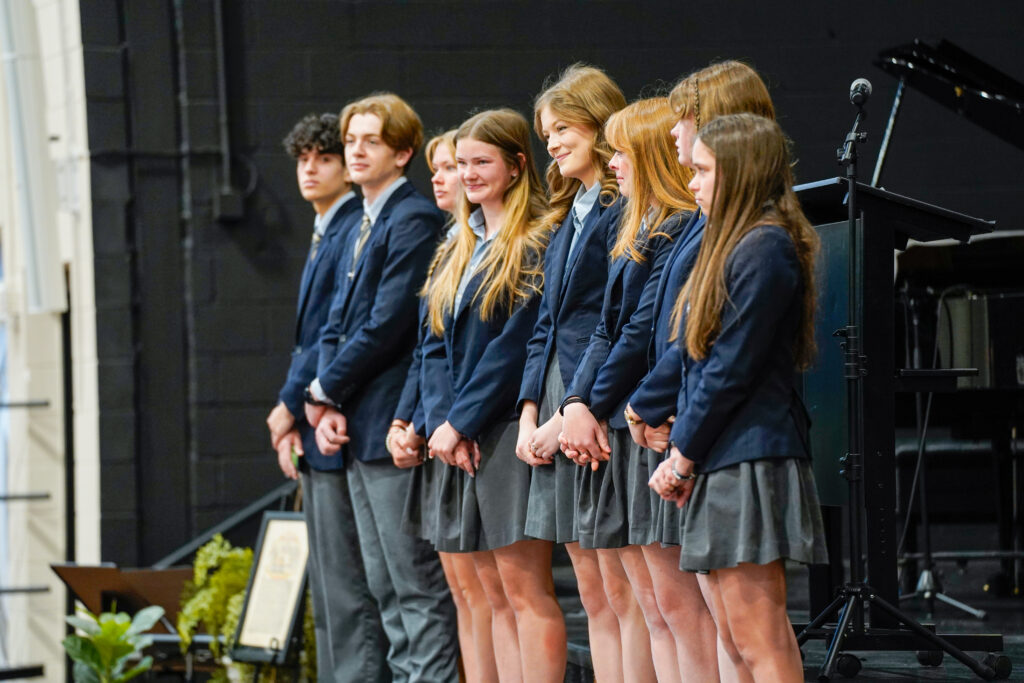
School of Rhetoric Questions?
Dr. Aaron Denlinger, Dean of Rhetoric School
adenlinger@armadeiacademy.com
Admissions Questions?
admissions@armadeiacademy.com
You may begin the application process at www.armadeiacademy.com/admission/.
School of Rhetoric Pamphlet (download)
Good Soil | The Classical Difference (video)
Association of Classical Christian Schools
It is no wisdom to make boys (and girls) prodigies of information; but it is our wisdom and our duty to cultivate their faculties each in its season, first the memory and imagination, and then the judgment; to finish them with the means, and to excite the desire, of improving themselves, and to wait with confidence for God’s blessing on the result. – Thomas Arnold (1795-1842)
